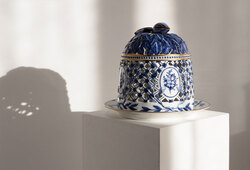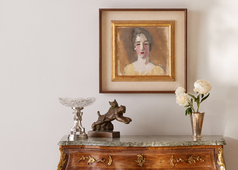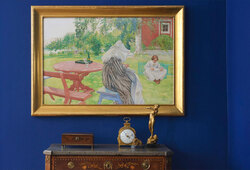Anders Zorn
Anders Zorn, "Änkedrottning Sophia".
Etching, 1909, signed in pencil. P. 24.8 x 17.9 cm.
Not examined out of frame.
Literature
Asplund 223, Hjert & Hjert 144.
More information
Sofia of Nassau was born in July 1836 at Biebrich Castle in the Duchy of Nassau in Germany and was the daughter of Wilhelm of Nassau-Weilburg and Pauline of Württemberg. In the summer of 1856, she stayed with her older half-sister Marie at Monrepos Castle. There, she met Prince Oscar (II), whom she married the following year, and with whom she had four sons. Sofia is known for her extensive charitable work. Inspired by the new nursing practices championed by British Florence Nightingale, whose knowledge began to spread in Europe, the queen established the first nursing education in Sweden and laid the foundation for the Sophiahemmet hospital in Stockholm. She served as chair of the board and remained engaged in education throughout her life.
Artist
Anders Zorn, born in Mora in 1860, showed artistic talent from a young age. In 1875, he traveled to Stockholm and became a student at the then Slöjdskolan (now Tekniska högskolan) in Stockholm, and shortly after, he joined the Royal Academy of Fine Arts. Initially, Zorn had aspirations of becoming a sculptor, but soon watercolor painting took over, becoming his primary medium until 1887. At the student exhibition in 1880, Zorn had his breakthrough with the watercolor painting "I sorg." The following year, he gained international acclaim as a portrait painter. His watercolor painting reached its pinnacle during this period, and his most famous work from this time is "Vårt dagliga bröd” from 1886. Shortly thereafter, Zorn transitioned to oil painting, which was met with immediate success. Zorn's reputation mainly rested on his portrait art, and he portrayed many notable figures, including presidents. For instance, he created an etching of Theodore Roosevelt. His etchings significantly contributed to his success. In the late 1880s, Zorn began working in the genre that would increasingly become his trademark: nude figures in outdoor settings. He had long been fascinated by the movement of water and the reflections of light on its surface. Now, he added the complexity of placing a model near or in the water, aiming to depict a synthesis between nature and humanity. In 1896, Zorn and his wife moved back to Sweden and settled in Zorngården in Mora. This move sparked a renewed interest in his homeland, which would be reflected in his future paintings. Among the artist's scenes from the Mora region, portraying its local customs and ancient traditions, "Midsommardansen" holds the highest value according to Zorn himself. Today, the painting can be found at the National Museum.
Read more

































